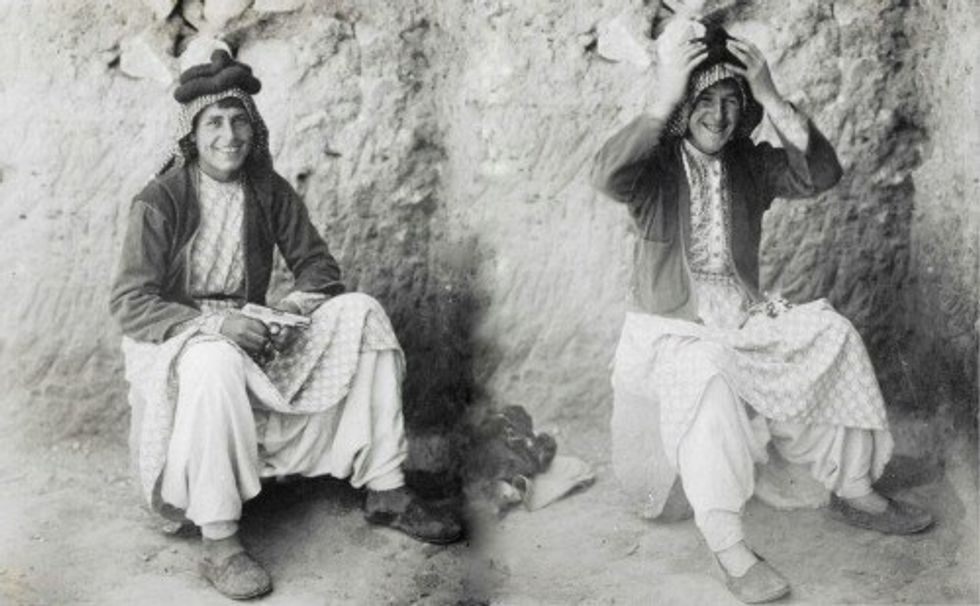The Middle East today is a very conservative place, and one that is in turmoil. To live in any way that does not agree with the majority, or to those in power, is dangerous. This is ever more clear these days, as ISIS remains a fear in the hearts of people worldwide, but mostly to those civilians in closest proximity to the group. It's hard to believe, but the Middle East was on the brink of a brand new, culturally-understood way of life in the early 21st century, and it would have been such if it were not for the actions of two massive imperial powers: the English and the French. This new way of life that the Middle East almost lived was driven by the critical works of one man, a man who felt was "more Arab than English," Thomas Edward Lawrence (a.k.a. Lawrence of Arabia).
That's right, I'm talking about TE Lawrence again. My apologies to my dedicated readers.
So, Lawrence was an archaeologist that literally walked through most of Arabia, hence his nickname, Lawrence of Arabia. He was seen by older archaeologists as a prodigy of the field, being only in his early twenties but organizing whole crews of workers in digs. When World War 1 began, he was recruited as an intelligence officer because of his extensive knowledge of the area. He was a very successful intelligence officer, and became a catalyst to the fall of the Ottoman Empire. As the war came to a close, Lawrence proposed a manner of dividing the newly liberated Middle East based on cultural differences and traditions, in a way that would establish states in the most peaceful, cohesive region possible. At the same time, however, the English and French divided the region as well, but to their best benefit. Lawrence's plan was dismissed, and his beloved Arabs believed him to be a traitor. Lawrence left Arabia at the end of World War 1, never to return. This was the first major step to the Middle East becoming what it is today, in all of its conservative laws and turmoil, and it all may have been prevented if Lawrence's plan would have worked out.
The greatest irony, however, has yet to be explained. I keep mentioning how conservative the Middle East is for a reason, and that is primarily because of their strict views on homosexual relationships. Egyptian police arrest gay men regularly, Saudi Arabia fined a school about $26,000 for painting a roof in rainbow stripes, and throughout the rest of the Middle East, it is in the majority opinion that homosexuality cannot exist.
It's never been 100% confirmed, but it is almost entirely certain that Lawrence had some form of romantic relationship with an Arab boy named Selim Ahmed. He lovingly called Ahmed "Dahoum," meaning "little dark one," as a joke of Lawrence's because Dahoum was a relatively pale Arab. The two were very close, as Lawrence considered Dahoum a fellow "dreamer of the day," and accepted the boy to teach him Arabic. The two were inseparable, and cared deeply for each other. Lawrence brought Dahoum to England and helped educate him in his dream to get an education (Dahoum was in his teens). Dahoum passed away in 1916 as the result of a famine and typhus outbreak, while Lawrence was fighting in the war.
(Dahoum left, Lawrence right)
Why does Dahoum matter in this story? As mentioned, Lawrence cared deeply for his pupil, and the two may have had a romantic relationship. Whether they did or not, Lawrence certainly loved Dahoum, as he dedicated his novel, The Seven Pillars of Wisdom to him, writing,
"I loved you, so I drew these tides of men into my hands and wrote my will across the sky in stars to earn you Freedom, that seven-pillared worthy house, that your eyes might be shining for me when we came..."
In Anthony Sattin's book, Young Lawrence: A Portrait of the Legend as a Young Man, Lawrence explains his motives for fighting in World War 1. Sattin writes,
"The fourth motive, which he listed first and which by his own reckoning was the most important, was personal: 'I liked a particular Arab very much, and I thought that freedom for the race would be an acceptable present.'"
So, there's the tragedy, and the irony. The man of legend who fought for a new Middle East but in the end was defeated by the imperial powers of the time, did it all out of the love for another man. With the failures of Lawrence and the imperial powers, the Middle East took the first step towards the modern-day Middle East, a place that arrests homosexuals for their practices, and is in constant turmoil. I believe it is fair to say that, if Lawrence could see what became of Arabia and the rest of the Middle East, it is easy to imagine him simply wondering what could have been.

























